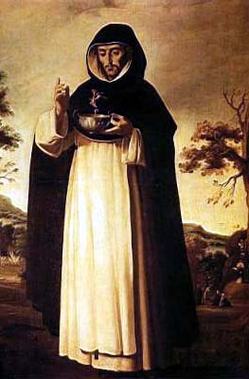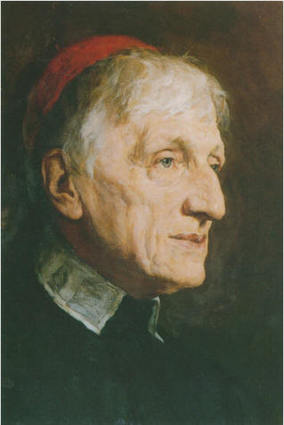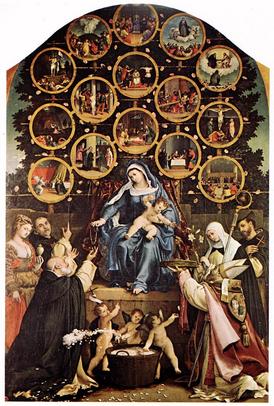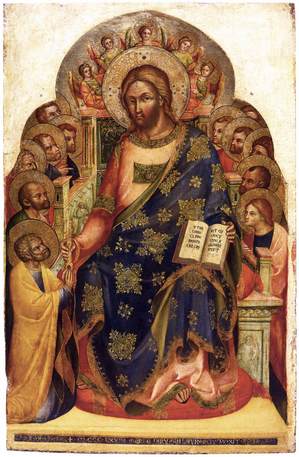…ask the angels for help…
Saint Louis Bertrand
 Proclaim the glory of the Lord among the nations; God’s marvelous deeds to all the peoples; great is the Lord and worthy of all praise.
Proclaim the glory of the Lord among the nations; God’s marvelous deeds to all the peoples; great is the Lord and worthy of all praise.
Hymn for Blessed John Henry Newman’s feast day
![]() O God, the source of wisdom’s fire,
O God, the source of wisdom’s fire,
Who formed the mind of man
In complex and mysterious ways
Within Your loving plan,
We thank You now for calling forth
This priest who praised Your Name
By teaching and exalting you
In words of living flame.
John Henry Newman, England’s son,
Was formed in Oxford’s halls,
Endowed with tow’ring intellect
To answer all the calls
Which Church and University
Gave forth in times of doubt,
A rebirth of the ancient truths
As rain for minds in drought.
He served the Church of England well
With scholarship and grace,
Restoring ancient roots of faith,
Removing error’s trace.
But scorned by leaders of his time,
He left his Oxford home,
In search of kindly, leading light
Which led him on toward Rome.
Continue reading Hymn for Blessed John Henry Newman’s feast day
Blessed John Henry Newman
 O God, who bestowed on the priest Blessed John Henry Newman the grace to follow Your kindly light and find peace in Your Church; graciously grant that, through his intercession and example, we may be led out of shadows and images into the fulness of Your truth.
O God, who bestowed on the priest Blessed John Henry Newman the grace to follow Your kindly light and find peace in Your Church; graciously grant that, through his intercession and example, we may be led out of shadows and images into the fulness of Your truth.
“God has created me to do him some definite service. He has committed some work to me which he has not committed to another” (JH Newman, Meditations on Christian Doctrine).
Blessed John Henry’s feast day today is the anniversary of his conversion to Catholicism and not the date of his birth into eternal life (death), as most of the saints are honored.
The other Propers for Mass and the Office of Readings for Newman’s feast day can be found here.
World’s “Oldest” Catholic university to reconsider “Catholic” identity
The Catholic University of Lueven, founded in 1425 by Pope Martin V is said to be entering into a process to re-consider their Catholic identity, even to the point of removing the adjective “Catholic” from their title, a news item on the Cardinal Newman Society’s webpage said, reporting a Brussels-based news article on October 7.
The university’s rector Mark Waer, 59, a trained physican and medical researcher in nephrology and immunology, has reportedly said, “The Catholic message is not appropriate for the university…” after the criticism from Catholics about the granting of the Nobel Prize to the instigator of IVF technology. Waer only began his term as rector of the university in 2009.
The University’s mission statement can be read here.
Ushaw College Seminary to close in 2011
UK’s The Tablet ran a news piece today saying the seminary for the North of England dioceses, Ushaw College, is closing at the end of the school year in June 2011. Currently, 7 English dioceses are served by UC. Ushaw was first founded in Douai, France in 1568 and has been located four miles west of Durham City since 1808.
From its heyday of 400 men studying for the priesthood to 26 today, the Ushaw has a staff of 62.
The story of Ushaw is grim and it sounds like St Joseph’s Seminary (Dunwoodie) which has fewer than 25 seminarians for the secular priesthood. For the time being SJS is working alone and is slated to merge with Huntington’s seminary.
4 Pillars of the Catholic Faith
A question was asked of me about the building blocks of the Catholic faith. Is there such a thing? Do Catholics actually have a structure of belief? Well, yes, there are 4 essential building blocks of our life of faith. These 4 areas are the very same areas by which the Catechism of the Catholic is structured.
truth. Spirituality needs to be founded on truth otherwise you have nothing.
Hence creed, code & cult are essential aspects of Catholic Faith.
qua.
the Church through divine revelation or sacred tradition (it is what is considered to be objective, verifiable faith).
(“faith by which”) is the faith by which a person is moved to respond
to God. A person’s understanding of his or her personal relationship
to God is spoken of here; here we usually filter what hear of divine revelation; in some instances personal
revelation is located in this type of faith, e.g., the teachings of the saints would be a distinction of fides qua (we’ll say this is subjective faith, a faith known through concrete experience).
distinguish between fides quae and fides qua and to always maintain conformity
in study and work with fides quae. Only a few theologian have held a personal
faith that has been enlightened enough to illuminate fides quae. The task of
theology is gain a deeper understanding of faith; it is, as St Anselm said:
faith seeking understanding. Our study of theology is done on our knees; that
is, we study the fact of God and the allied theological sciences from a posture of adoration of
God first, in the sacred Liturgy and second, in personal prayer.
theology takes his or her first presupposition from the position of “faith.” Faith is not a gift of God it is also the manner by which we look at
reality, it’s the “starting point for a new way -that is, a true way of
becoming aware of reality itself.” Through faith we have access to truth and through we live truth. Without faith in the study of theology
we have mere religious studies.
Supporting Catholic Schools
This morning the Archbishop of Hartford, Henry J. Mansell hosted what has become the annual Columbus Day Breakfast to provide scholarship grants to students attending Catholic elementary schools in greater New Haven. The Archbishop assisted by the Foundation for the Advancement of Catholic Schools helped us to look with fresh eyes at the need for Catholic education in greater New Haven. I am very happy to have been invited to attend this morning’s breakfast.
Sacred Duties, Episcopal Ministry: what’s wrong with the US Conference of Bishops
Few people in these parts (in the Eastern part of the USA) know the name Robert F. Vasa except ecclesial-philes like myself, but that’s because he’s on the other side of the country. Never mind. Who could say with honesty that there’s a genuine concern for knowing ecclesial affairs viz. from a person who has little name recognition such as Robert Vasa. That is, until now, who, with some excellent, even controversial ideas, is sure to anger the round heads. Only now Vasa’s thinking is gaining some currency. But let’s give him his just due respect. Robert F. Vasa, 59, is the Bishop of Baker, OR, a priest of the Lincoln Diocese who delivered an extraordinarily good address titled, “Sacred Duties, Episcopal Ministry” on September 16, 2010 at the 2010 InsideCatholic Partnership Award Dinner in Washington, DC, that has not received the attention it deserves.
Our Lady of the Rosary
 I once told a youth director who was getting “heat” from his colleagues for having his parish youth group pray the rosary that that prayer is really Scripture study. What else could you call the each of the mysteries, the Hail Mary and the Lord’s Prayer? On the simplest level praying the rosary is not only a tool of spiritual education in the School of Mary, but also uniting oneself more and more closely to the Lord.
I once told a youth director who was getting “heat” from his colleagues for having his parish youth group pray the rosary that that prayer is really Scripture study. What else could you call the each of the mysteries, the Hail Mary and the Lord’s Prayer? On the simplest level praying the rosary is not only a tool of spiritual education in the School of Mary, but also uniting oneself more and more closely to the Lord.
It is often said that if you want to end sin in your life, evil in the world, that is, to slice the head off evil, then pray the Rosary. I see more rosaries around the rear view mirror or around the neck but so rarely in those same hands fingering the beads of the Mysteries of the Jesus’ life, death and resurrection. In the rosary we trace the lines of salvation history and the beautiful mission of Jesus.
Pope, saints, good priests and religious and grandmothers recommend wholeheartedly our attachment to this divine gift of love.
The previous year’s post for this feast is here.
The infant church in prayer was gathered round
Th’apostles and the Mother of the Lord;
In faithfulness to Christ’s farewell command,
They prayed and waited, trusting in the Word.
With joy we think on incarnation’s grace;
With light we meditate upon Christ’s life;
With sorrow, all his passion keep in mind;
And in his glory, hope beyond all strife.
For Mary’s faithfulness we praise you, Lord,
who heard and trusted in your promise strong;
To you we sing, O Trinity most blessed,
In praise that through the ages echoes long.
10 10 10 10
SURSUM CORDA
